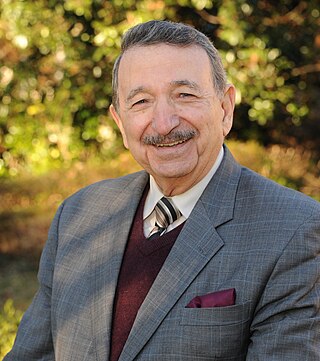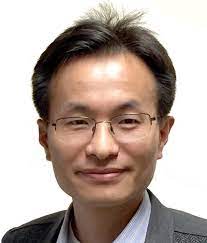Related Research Articles

Armand Paul Alivisatos is an American chemist who serves as the 14th president of the University of Chicago. He is a pioneer in nanomaterials development and an authority on the fabrication of nanocrystals and their use in biomedical and renewable energy applications. He was ranked fifth among the world's top 100 chemists for the period 2000–2010 in the list released by Thomson Reuters.

Mostafa A. El-Sayed is an Egyptian-American physical chemist, a leading nanoscience researcher, a member of the National Academy of Sciences and a US National Medal of Science laureate. He was the editor-in-chief of the Journal of Physical Chemistry during a critical period of growth. He is also known for the spectroscopy rule named after him, the El-Sayed rule.

Mark C. Hersam is a professor of Chemistry and Materials Science Engineering at Northwestern University (2000–present) who, according to the National Science Foundation, has made "major breakthrough[s]" in the field of nanotechnology. He is a 2014 recipient of the MacArthur "Genius" Award and a 1996 Marshall Scholar. He is also an Associate Editor of ACS Nano. As of January 2022, he was cited over 54,500 times according to Google Scholar.

Peidong Yang is a Chinese-American chemist, material scientist, and businessman. He is currently a professor at the University of California, Berkeley and a member of the American Academy of Arts and Sciences. He is a Professor of Chemistry and a Professor of Materials Science. His research group studies the synthesis of nanomaterials and their electronic and optical properties. He is also a Department Head at the Joint Center for Artificial Photosynthesis, Senior Faculty Scientist at Lawrence Berkeley National Laboratory, and Deputy Director of the Center of Integrated Nanomechanical Systems (COINS). He is an associate editor of the Journal of the American Chemical Society, an American Chemical Society Journal.
Alan T. Charlie Johnson is an American physicist, professor of Physics and Astronomy at the University of Pennsylvania, and the Director of the Nano/Bio Interface Center at the University of Pennsylvania.
Apparao M Rao is the Robert A. Bowen Professor of Physics in the department of physics and astronomy, the director of the Clemson Nanomaterials Institute, and a former associate dean for discovery in the college of science at Clemson University. His research in nanoscience and nanotechnology has been cited over 47,500 times in open literature and his h-index is 90. He was elected as a fellow of the American Physical Society in 2008, the American Association for the Advancement of Science in 2011, the National Academy of Inventors in 2018, and the Materials Research Society in 2020. In 2012, he received the Alumni Award for Outstanding Achievements in Research, and has served on the Advisory Panel for the Dean and the Vice-President of Research, Clemson University. His research and development efforts led to the recent establishment of Clemson Nanomaterials Institute, which is supports sustainable research and development capacity and competitiveness in the U.S. state of South Carolina.

Miguel A. García-Garibay is a professor of chemistry and biochemistry and the dean of physical sciences at University of California, Los Angeles (UCLA). His research focuses on solid state organic chemistry, photochemistry and spectroscopy, artificial molecular machines, and mesoscale phenomena.
Uwe Paul Erich Thumm is a German-American physicist with research interests in atomic, molecular, and optical physics and nanoscience. A distinguished physics professor at Kansas State University and the J. R. Macdonald Laboratory in Manhattan, Kansas his research team investigates the ultrafast dynamics of electrons and molecular fragments in laser-matter and particle-matter interactions, highly-charged-ion physics, electron–atom collisions, and plasmonic nanostructures. He is a Fellow of the American Physical Society and recipient of several awards, including the Senior Research Award of the Alexander von Humboldt Foundation.
Nadya Mason is the Rosalyn Sussman Yalow Professor of Physics at the University of Illinois at Urbana-Champaign. As a condensed matter experimentalist, she works on the quantum limits of low-dimensional systems. Mason is the Director of the Illinois Materials Research Science and Engineering Center (I-MRSEC) and, since September 1 of 2022, the Director of the Beckman Institute for Advanced Science and Technology. She is the first woman and woman of color to work as the director at the institute. In 2021, she was elected to the National Academy of Sciences.
Stacey Bent is a professor of Chemical Engineering and Vice Provost for Graduate Education and Postdoctoral Affairs (VPGE) at Stanford University. She is the Jagdeep and Roshni Singh Professor of Engineering and a member of the National Academy of Engineering. She was the director of the TomKat Center for Sustainable Energy and a senior associate dean in the Stanford School of Engineering until 2019. She is best known for contributions to semiconductor processing, materials chemistry, and surface science. Her work has been applied toward applications in semiconductors, solar cells, and catalysts.
Sherine O. Obare is the Dean of the Joint School of Nanoscience and Nanoengineering at the University of North Carolina at Greensboro and North Carolina Agricultural and Technical State University. She works on nanomaterials for sensing and drug delivery.
Richard D. Robinson is an Associate Professor of Materials Science and Engineering at Cornell University.
Sandra J. Rosenthal is the Jack and Pamela Egan Professor of Chemistry, Professor of Physics and Astronomy, Pharmacology, Chemical and Biomolecular Engineering, and Materials Science at Vanderbilt University. She is a joint faculty member at Oak Ridge National Laboratory in the Materials Science and Technology Division and the Director of the Vanderbilt Institute of Nanoscale Science and Engineering.
Michael J. Therien is the William R. Kenan, Jr. Professor of Chemistry at Duke University.
Elisa Riedo is an academic in the fields of physics, nanotechnology and engineering. She is a professor at New York University Tandon School of Engineering and the director of the picoForce Lab.
Clare McCabe is a American chemical engineer who is Cornelius Vanderbilt Chair of Engineering and Professor of Engineering at Vanderbilt University. She was elected Fellow of the American Association for the Advancement of Science in 2019. Her research makes use of molecular modelling to understand the properties of biological systems, fluids and nanomaterials.
Katherine E. Stange is a Canadian-American mathematician and an associate professor of mathematics at the University of Colorado Boulder. She is a number theorist specializing in topics in arithmetic geometry.
Sarah Helen Tolbert is an American chemist who is a Professor in the Department of Chemistry and Biochemistry at the University of California, Los Angeles. Her research considers self-assembled nanomaterials, which includes inorganic phases and colloidal materials.

Chunying Chen is a Chinese chemist who is a professor at the National Center for Nanoscience and Technology. Her research considers nanoscale biological interactions. She was awarded the 2021 Royal Society of Chemistry Environment, Sustainability and Energy Award. She is a Fellow of the American Institute for Medical and Biological Engineering and the Royal Society of Chemistry.
Libai Huang is a Chinese-American chemist who is a professor at Purdue University. She is interested in unravelling the structure-property relationships of next-generation solar materials.
References
- 1 2 "Dukovic Research Group". Dukovic Research Group. Retrieved 2020-04-16.
- ↑ "Gordana Dukovic". Dukovic Research Group. 2015-12-14. Retrieved 2020-04-16.
- ↑ "Scientists make fertilizer using the power of the sun". UPI. Retrieved 2020-04-16.
- ↑ "Gordana Dukovic - Google Scholar Citations". scholar.google.com. Retrieved 2020-04-16.
- ↑ "Provost's Faculty Achievement Award for Pre-Tenure Faculty | CU Experts | CU Boulder". experts.colorado.edu. Retrieved 2020-04-16.
- ↑ Colorado, College of Arts and Sciences, University of. "Colorado Arts & Sciences Magazine » Gordana Dukovic wins Sloan Research Fellowship" . Retrieved 2020-04-16.
- ↑ "Dukovic Named Beckman Young Investigator". 2014-10-27. Archived from the original on 2014-10-27. Retrieved 2020-04-16.
- ↑ "NSF Award Search: Award#1151151 - CAREER: Research and Education for a Solar Future: Fundamentals of Nanocrystal Photochemistry and Integration of Solar Energy Research into Physical Chemistry Curriculum". www.nsf.gov. Retrieved 2020-04-16.